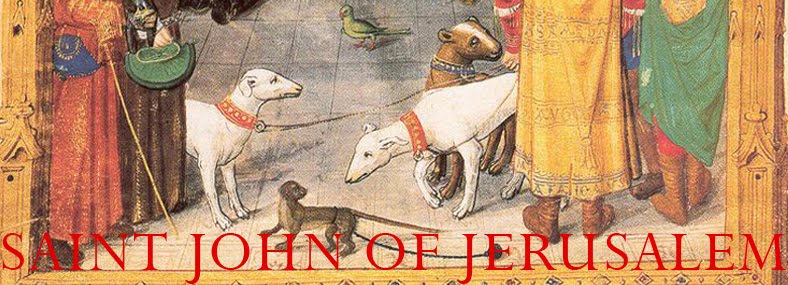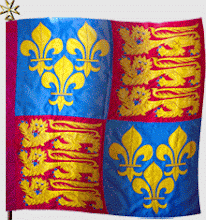We are profoundly grateful to Fr Dominic Robinson, who gave the most inspiring mediation at the evening of recollection last Thursday, having celebrated the first Mass of the Feast of St Joseph, in a sung plainsong Latin Mass in the Ordinary Form.
The shrine of Saint Joseph in the Conventual Church
Forty members of the Order, Companions, Patients and regular Mass-goers attended the evening, which concluded with holy hour, confessions and Benediction.
Fr Robinson has been so gracious as to provide a resume of his mediation, which we include below, for the benefit both of those who wish to dwell further upon his talk, and for those unable to attend:
You are recommended to read the Gospel passage first, John 11:1-45, a text
may be found here:
A.M.D.G.
I am basing my talk
on the Gospel of the 5th Sunday of Lent for Year A. This is always an option for this coming Sunday, especially from
a catechetical point of view as there are some very important Lenten themes. So it is also useful for reflection in our
pilgrimage of faith leading to the Easter Festival. And it’s good to take time now to reflect on the Word of God the
Church prescribes for the Liturgy and to pray with it – as Benedict XVI encourages
us to do repeatedly.
I will give 3 basic
points:
1) On our intimacy with Christ & inner
disposition – prayer, also fasting & almsgiving as outward expression of
this.
2) The Sacrament of Confession, Penance & Reconciliation,
& spiritual resurrection, restoration of intimate friendship with God
3) Seeing the power of this Sacrament which
comes from God through the Church, from outside of myself in my human finitude.
1) Lazarus
comes out of his cave to be untied at Jesus’ command, but what’s in the
background here; what’s between the lines in this great drama of new life? Who is this Lazarus?
·
Lazarus is
the man who is also part of an ordinary human family who cares deeply for him. They have lived, loved, and struggled
together. They are people with
similar character traits as us and our own families: sometimes like Martha,
perhaps veering towards the obsessive and pushy – yet still caring always for
those whom she loves; sometimes
like Mary – breaking down, unable to cope amid the confusion and sorrow, yet still
lovingly doing her best.
·
And into
this family walks Jesus and he becomes the centre of this family not as a
walk-in part in this incident at which Lazarus is raised to life, but over time
he becomes part of this family, and we’re told He loves Lazarus deeply.
·
And we
can imagine that Jesus is gradually welcomed into their lives: and there is a
process of transformation to greater unity, greater faith, and greater love.
·
So we
are invited to see ourselves as we are, with all our sinfulness, all our hardness
of heart, the annoying aspects of our personality, and to welcome Christ in to
get to know us: so to be honest about our everyday struggles, whether in our
families, at work, or wherever, and to be prepared to allow Jesus to be right
there in the middle of us, and to know He comes to us as the One Who loves us,
and who wants to stay with us.
·
And so
to spend time in prayer, examining our consciences and asking myself am I
disposed to let Our Lord in, or are there particular things I do or maybe don’t
do, which shut him out. So we need
to ask: where is my sin? Sin is
that which shuts out God. And to
be able to do that we are called also in Lent to give alms and to fast: the
exterior expression of our desire to let Christ in can help our interior disposition:
but the key is disposition – am I ready to let Him into my life: that’s
something to ponder for ourselves.
2) And that’s really just the start, the
necessary inner disposition, recognising my sin, and allowing Our Lord into my
home.
·
But let’s
return to the Gospel because this story is much more dynamic. Because what ensues is a great miracle
– a miracle which unbinds Lazarus from death and restores him to life.
·
Note,
however, that he comes out in his burial clothes – unlike Our Lord who is re-clothed
in a glorious body. Lazarus is
unbound and returned to life with his family, which will involve pain,
suffering, sin, but he knows deeply how the Lord Who loves him deeply is with
him constantly. And when we
encounter the Lord He constantly wants to unbind us, to call us back into His Family, that is to the Church, and
there - in the sacraments which mediate Christ’s Presence – and in particular the Sacrament of Confession – of
Penance and Reconciliation – the sacrament which unbinds us and again and again,
returns us to His Family strengthened for the earthly pilgrimage.
·
A
little about this wonderful sacrament: the Catechism of the Catholic Church is
incredibly rich on the effects of this sacrament in
our lives of friendship with God:
1468
‘The whole power of the sacrament of Penance consists in restoring us to God’s
grace and joining us with him in an intimate friendship. Reconciliation with
God is thus the purpose and effect of this sacrament. For those who receive the
sacrament of Penance with contrite heart and religious disposition,
reconciliation “is usually followed by peace and serenity of conscience with
strong spiritual consolation.” Indeed the sacrament of Reconciliation with God
brings about a true spiritual resurrection, restoration of the dignity and
blessings of the life of the children of God, of which the most precious is
friendship with God’.
It
is then that intimacy with Christ, that peace of mind in knowledge that we are
part of God’s Family and doing His will that the Sacrament brings,
reconciliation with God’s Family, that is the Church:
1469
‘This sacrament reconciles us with the Church. Sin damages or even breaks
fraternal communion. The sacrament of Penance repairs or restores it. In this
sense it does not simply heal the one restored to ecclesial communion, but has
also a revitalizing effect on the life of the Church which suffered from the
sin of one of her members. Re-established or strengthened in the communion of
saints, the sinner is made stronger by the exchange of spiritual goods among
all the living members of the Body of Christ, whether still on pilgrimage or
already in the heavenly homeland: For
it is now, in this life, that we are offered the choice between life and death,
and it is only by the road of conversion that we can enter the Kingdom, from
which one is excluded by grave sin. In converting to Christ through penance and
faith, the sinner passes from death to life’.
3) A
final point returning to the Gospel story:
·
Imagine the scene of this unbinding: it’s worth thinking about. Is Lazarus now come to life unbinding
himself slowly? No – that’s
actually impossible – he needs to be
unbound. And that’s worth
pondering. In our own culture we hear much about self-help, detox, rehab,
spiritual spring-clean on our own – but for us this is impossible. Our own efforts are a necessary
precondition – we need to make an effort - but we are unbound of our sins and
restored to friendship with God by Christ through the sacrament and in the
Church for the Church.
·
I think – as again and again – Pope Benedict puts his finger on the
challenge posed by our western culture obsessed with self-help spirituality and
feel-good religion in understanding this: - in his Lenten address he comes at
it from the perspective of the justice of Christ, which is expressed in the
power of His unconditional loving mercy:
‘What
then is the justice of Christ? Above all, it is the justice that comes from
grace, where it is not man who makes amends, heals himself and others. The fact
that “expiation” flows from the “blood” of Christ signifies that it is not
man’s sacrifices that free him from the weight of his faults, but the loving
act of God Who opens Himself in the extreme, even to the point of bearing in
Himself the “curse” due to man so as to give in return the “blessing” due to
God (cf. Gal 3, 13-14). … In reality, here we discover divine justice, which is
so profoundly different from its human counterpart. God has paid for us the
price of the exchange in His Son, a price that is truly exorbitant. Before the
justice of the Cross, man may rebel for this reveals how man is not a
self-sufficient being, but in need of Another in order to realize himself
fully. Conversion to Christ, believing in the Gospel, ultimately means this: to
exit the illusion of self-sufficiency in order to discover and accept one’s own
need – the need of others and God, the need of His forgiveness and His
friendship. So we understand how faith is altogether different from a natural,
good-feeling, obvious fact: humility is required to accept that I need Another
to free me from “what is mine,” to give me gratuitously “what is His.” This
happens especially in the sacraments of Reconciliation and the Eucharist.
Thanks to Christ’s action, we may enter into the “greatest” justice, which is
that of love (cf. Rm 13, 8-10), the justice that recognizes itself in every
case more a debtor than a creditor, because it has received more than could
ever have been expected. Strengthened by this very experience, the Christian is
moved to contribute to creating just societies, where all receive what is
necessary to live according to the dignity proper to the human person and where
justice is enlivened by love.’
·
So I encourage you now to ponder this well-known Gospel story and what
I’ve said and to ask yourself what is my inner disposition to friendship with
God in prayer?
·
And am I aware of the power of the Sacrament of Confession to restore
it?
·
Do I see in the Sacrament the power of Christ, the Lover Who is the
Other Who alone can unbind me and restore me to God’s family?
Fr Dominic Robinson, SJ
19th March
2010


















